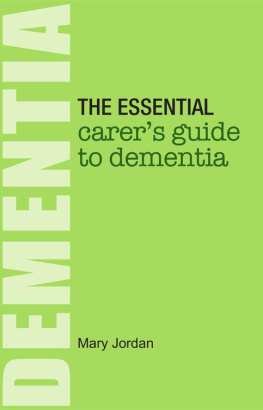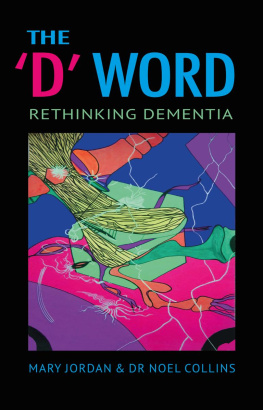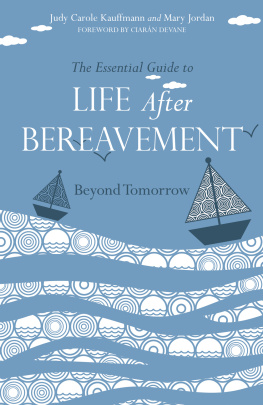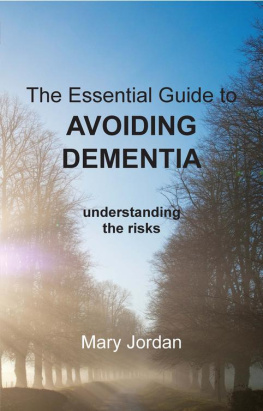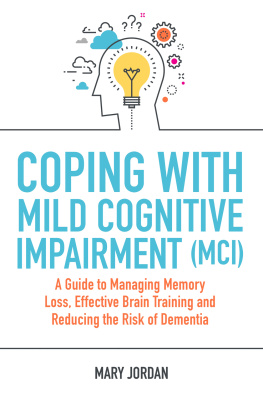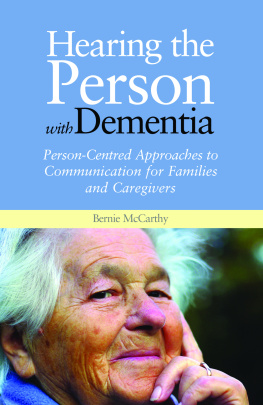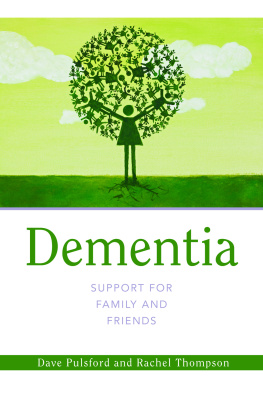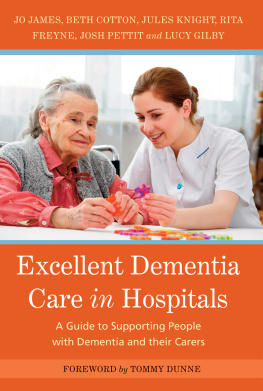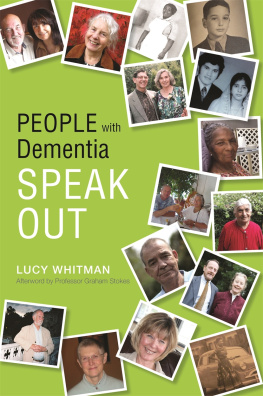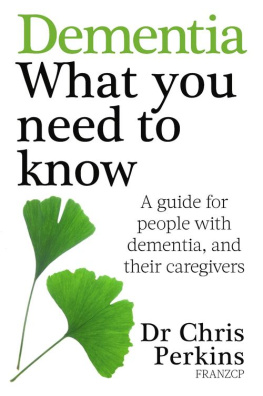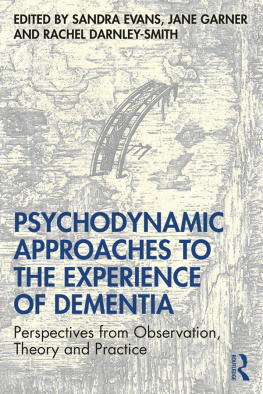No book is written without help and support from others. I would particularly like to thank Dr Noel Collins, MB BS (Hons), MRCPsych who read, corrected and commented upon the chapter About Dementia and Dr Doug Brown, Director of Research and Development, Alzheimers Society who gave specific comments on the paragraphs about genetics in that chapter. Dr Gillian Nienaber, BA Hons, BSc Hons, CinPsychD, gave me help with the research and information generally. Karen Woodger RN(MH), MSc Counselling & Psychotherapy and Janice Cresdee IOSH, Registered Team Manager at Surrey County Council, both gave me valuable information about Care plans, as did Amanda Emerson also of Surrey County Council.
As with my previous books, my thanks are due to Janet Baylis and Andrew Holland at Alzheimers Society Dementia Knowledge Centre who once again gave me an enormous amount of help to find relevant research papers and books and other useful information. The Dementia Knowledge Centre is open to anyone via Alzheimers Society website and is a great resource for anyone interested in learning more about dementia: www.alzheimers.org.uk/dementiacatalogue
I would also like to give special thanks to my editor Georgina Bentliff who has been a source of great technical support, much encouragement and endless patience, always.
My friends and family have been very helpful in supplying and giving me permission to use the case history examples and I certainly could not have completed the book without their encouragement, the support of my two sons, Tristram and Rauf, and the many practical suggestions of my daughter-in-law, Erica Arnold.
You may be wondering what led me to write this book. I work to support people with dementia and their families. When people are first referred to me they generally have one of two reactions. Either they thank me and say they will contact me when they need me and go away or they come to me in complete bewilderment and anxiety, unsure what I can do to help but believing that, as the doctor has referred them, they are doing the right thing.
In fact, as I point out in this book, doctors can only help so much following a diagnosis of dementia. The truth is that medication is of limited use. This does not mean that it is not worth trying indeed, I am in favour of anyone who may possibly benefit at least trying to see if one of the memory drugs can help. When faced with a devastating disease for which we have no known cure, why would you not try whatever modern medicine has to offer particularly as the side effects to this medication are usually minor and can be stopped at once by discontinuing the drug?
I believe that at this present time the most important thing that can be offered to people who have been confronted by the D word whether as a carer or as someone who has just been diagnosed is support. When people ask me what my job is, this is how I like to sum it up: I offer support. I have been most fortunate in that my job role is defined in such a way that I am often able to tailor that support to what individuals require.
However, I can only spread my support so far. In many areas of the UK, dementia support workers like myself are able to give this support, but still, it is not enough. Through this book I hope to spread the support and advice, the knowledge and expertise that I and my colleagues have accumulated, a little wider and further. Even if you do not have access to a dementia support worker through the Alzheimers Society, you can get ideas, advice, information and support through this book.
You can read this book straight through or you can dip in and out as you feel the need. You will find a certain amount of repetition because some advice and information is relevant to many areas of care and concern. Where areas overlap I have referenced and directed readers back or forward to other chapters. There is also a handy reference section to which you can turn for further, or more in-depth, information on individual subjects.
What is dementia?
begins by describing what dementia really is, for those who wish to know. Dementia is not the same as Alzheimers disease, although many people use the terms interchangeably dementia is a symptom of many conditions, of which Alzheimers disease is the commonest, closely followed by vascular dementia. This book deals with dementia from all the common causes because, as the symptoms progress, there are very few differences between them, though many differences between individuals, whatever the cause.
also talks about some of the risk factors for dementia. We do not yet know what causes one person to develop the condition whilst others are spared, but we do understand some of the factors which raise the risk of any single person developing dementia. This chapter also helps someone who may be worried about their cognitive ability to differentiate between the normal mild cognitive impairment which is common in older people and true dementia. Only a doctor can diagnose the condition, but this chapter may help you to decide whether you should talk to your doctor about your memory or any related problems.
Not everyone wants to go into great detail about what dementia is or the path it is likely to follow, so some people may be tempted to skip wish to read in depth about what dementia is and how it may progress, you can just read the paragraphs written in bold type and have enough knowledge to help you understand the path ahead of you.
Why it helps to accept help
My advice starts in ), when it comes to dementia you cannot go it alone. Dementia is progressive and as it progresses the carer needs help in order to help the one with dementia. It is precisely the people who believe that they will not need help and support who should read this chapter with care.
At this point I would like to refer back to what I have said at the beginning of this introduction. There are people who refuse support at the time of diagnosis. Of course they are entitled to do that and no one would wish to force unwanted advice on them, or to interfere in the lives of any other person. I know, however, that I can give the best help in the early stages and am always pleased when I can work with people straight after diagnosis. Then I can give them the greatest opportunities to help themselves and to make small adjustments so that, as dementia progresses, they are in a better position to cope in their own way. In particular, people with dementia who live alone and accept support when needed are more likely to be able to continue living in their own home for longer and have a good quality of life while doing so.

